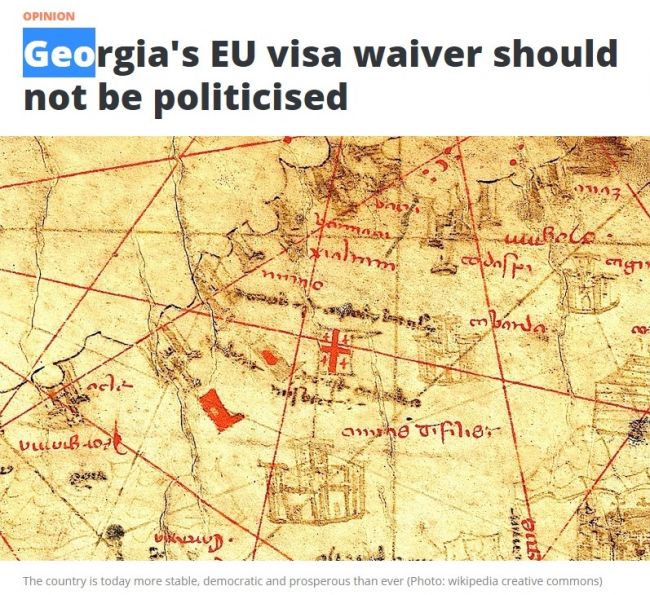
By CLARE MOODY
BRUSSELS, 5. SEP, 18:54
The EU is much in need of a success story. It is no secret that a string of recent events have seriously put the Union's cohesion and external credibility to the test: Brexit (which is, of course, close to my heart), public disagreements over the response to migration and the EU's response to terrorism and security concerns to name just three.
Against this backdrop, Georgia's bid to gain visa-free travel to the Schengen zone has suffered numerous delays, despite the country having been recognised as "ready" in December 2015. The EU should now embrace Georgia's success.
The procedure for a third country to obtain visa liberalisation is on paper quite straightforward. Countries must meet a number of strict criteria, evaluated and assessed regularly through dialogues and reports.
The European Neighbourhood Policy supports this approach - more for more, rewards for reforms. It is the core of the EU's much-discussed "soft power" approach to security and development.
In line with this, Georgia since 2012 has ratified seven international conventions as well as adopted eight national strategies, more than 60 legislative amendments and around 70 bylaws, instructions and regulations.
A reliable partner for the EU
While challenges remain, Georgia is today more stable, democratic and prosperous than ever - a reliable partner for the EU and a shining example of progress in a region which is strategically important for us.
Visa liberalisation is one of the most appealing "carrots" that the EU offers its neighbouring countries. It is something that 58 countries, from Albania to Venezuela, already enjoy.
It is not about being able to live, work or study in the EU; it does mean being able to travel freely to the EU's Schengen zone for short stays for tourism, civil society and student exchanges and to do business.
This offers a tangible reward for reforms which are often costly and painful. Increasing people-to-people exchanges also cements stability as people internalise European values and build networks as part of the broader European family of nations. It is therefore clearly equally in the EU's long-term interest.
The Georgian government is well aware of the significance of visa liberalisation and has unquestionably worked hard to not only meet but even surpass the EU's stringent criteria.
With a political work programme which sets EU integration as the number one priority and a popular support rate of more than 75 percent for this goal, the government has a clear interest in delivering something more tangible that legislative texts and alignment of technical standards. Again, the EU should certainly share this goal.
Yet, the EU has repeatedly delayed the decision on visa liberalisation, firstly with the hope of granting similar privileges to Ukraine at the same time, then to prioritise concluding the deal for Turkey. Confusion with debates on migration and crime have not helped.
Georgia is an easy win
Visa liberalisation is a technical procedure. It should not be politicised. But if everything is in reality always political, then all the political arguments stand behind maintaining and strengthening our commitments and partnership with Georgia.
The country's democratic credentials are sound, consistently climbing international rankings for free and fair elections, human rights, freedom from corruption and ease of doing business.
We in Brussels repeatedly describe the country as a "model student" and "frontrunner of the Eastern Partnership". These are empty words if they are not matched by fulfilment of our commitments.
The EU is in desperate need of a success story in its neighbourhood. We most certainly cannot afford to alienate our friends or give any credence to those who claim all the EU offers is empty promises.
On the contrary. Through its determined - if not stubborn - quest for EU integration and rates of public support far higher than in any EU country, Georgia carries forward the vision of a Europe free, fair, and united, at a time when this vision is seriously put to the test.
The EU has rightly constructed its identity as a global power on its ability to project soft or normative power. Delaying visa liberalisation for Georgians, after the country has met and surpassed all the benchmarks the EU has set, would jeopardise our credibility as a soft power and could have consequences on the EU's influence in the region as a whole.
Georgia is an easy win. By respecting its own side of the bargain the EU would gain far more than it risks losing.
Source: euobserver.com











